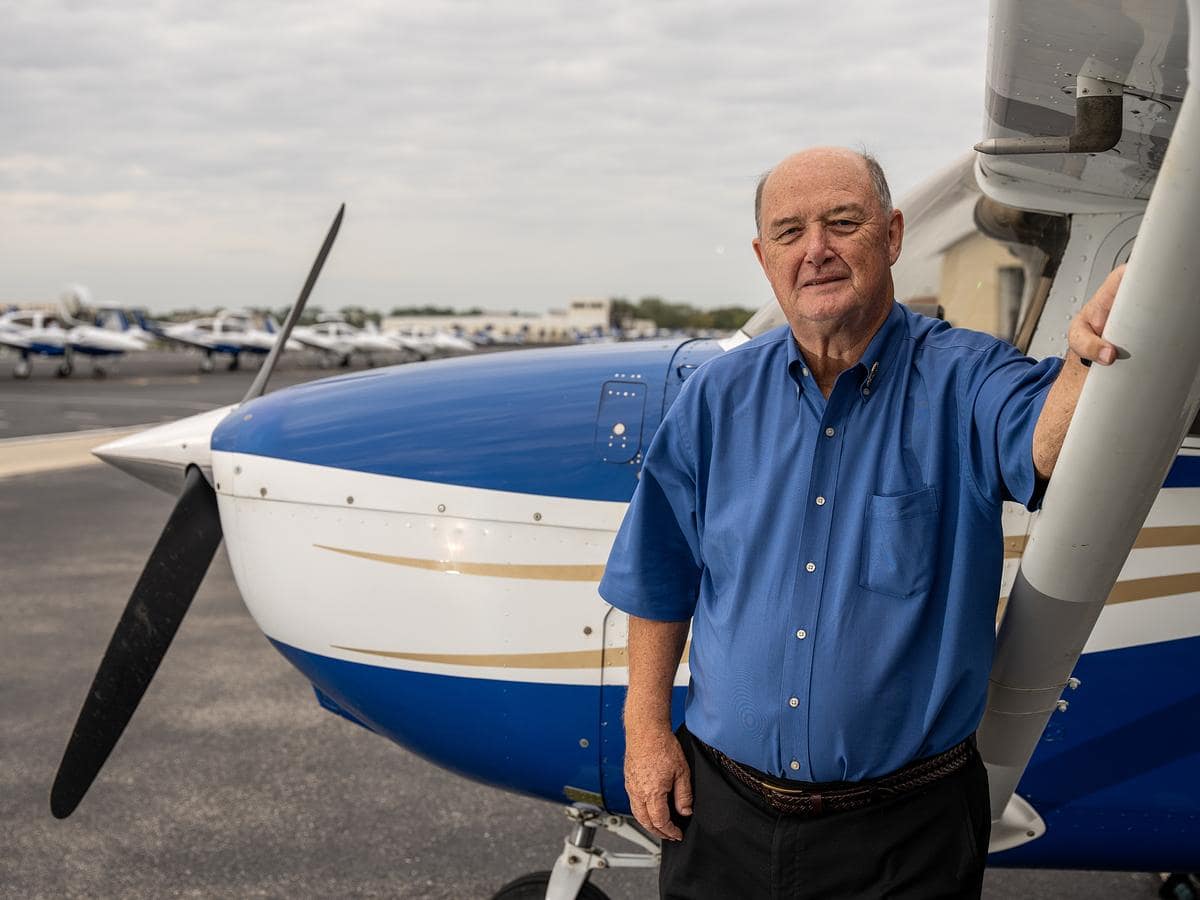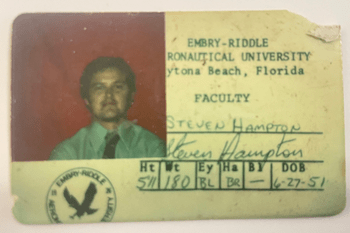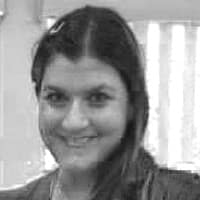Lessons From a Half Century at Embry-Riddle

Looking out his office window, Dr. Steven Hampton reflected on his 50-year career at Embry-Riddle Aeronautical University — and the amazing changes he’s seen along the way.
“Where the College of Aviation is now, there was an old runway,” said Hampton, currently an Aeronautical Science professor for Graduate Studies in the College of Aviation. “And Doolittle Hall, where I stayed when I arrived in the summer of 1973, is the only building remaining on campus now.”
In many ways, Hampton’s career growth parallels the university’s evolution from a flight school to a world-class aerospace university conducting cutting-edge research.
From England, he arrived at Embry-Riddle as a flight student and was hired in 1974 as a flight instructor. He earned degrees in aviation maintenance, aviation business and higher education. Hampton taught throughout his tenure, and he moved into research and leadership positions, including serving as associate dean for research at the College of Aviation.
“Steven played a crucial role in leading the committee that developed and established the foundation for the nation’s first Ph.D. in aviation program,” said Dr. Alan Stolzer, dean of the College of Aviation at the Daytona Beach Campus. “He is truly one of the architects of our highly successful doctoral program.”

A brick commemorating Embry-Riddle Professor Steve Hampton’s first solo flight in 1973. (Photo: Embry-Riddle/David Massey)
A Lifetime of Change and Growth
Hampton discovered Embry-Riddle by chance after he met some Eagle flight students while visiting the Caribbean. He decided to apply.
“I was visiting my wife Denise’s family in Trinidad when I found out I needed to start training at Embry-Riddle the next Monday,” he said.
After completing his flight training at Embry-Riddle and working as an instructor, he became a professor of flight technology and aeronautical science.
“I have always enjoyed teaching, and it has been nonstop teaching for 50 years,” he said.

Longtime Embry-Riddle Professor Steve Hampton still has one of his earliest employee ID cards. (Photo: Embry‑Riddle/Melanie Stawicki Azam)
Hampton loves to learn himself. He earned a bachelor’s degree in Aeronautical Studies: Flight Technology and Aviation Maintenance Technology in 1978. He went on to earn his Master of Business Administration in Aviation in 1981 and then later completed his doctorate in higher education in 1989 at Nova University.
He also discovered a passion for research.
In 1990, Hampton was awarded his first $2,500 grant to study personal computer-based flight training, a new concept at the time. This work led to collaborations on major projects with the Federal Aviation Administration and NASA. Hampton’s work on Personal Computer-Based Training Devices (PCATD) led to advisories and rules encouraging the use of the technology for flight training. Hampton then served as principal investigator for a team developing flight training programs for the NASA-sponsored Advanced General Aviation Transportation Experiment (AGATE) initiative.
Lana Laskey, who is now an associate professor and program coordinator for Space Operations in Embry-Riddle’s College of Aviation, met Hampton when she was a flight student in 1998. He asked her to be in his AGATE research project, which aimed to improve the safety of student pilots and private pilots by combining private pilot training with instrument rating training from the outset.
“Dr. Hampton recruited me as a participant, and I was the first to finish the AGATE program, demonstrating that the approach was possible,” said Laskey.
Appointed interim associate provost of Graduate Programs and Research in 2000, Hampton worked to increase the number of faculty involved in research and mentored many of them.
“I like research because it’s new and it keeps the mind going,” he said. “To me, it’s invigorating.”

Embry-Riddle Professor Steven Hampton is accompanied by his wife, Denise, and their three sons — Justin, Nicholas and Trevor — at an event at the College of Aviation to celebrate his 50th anniversary at the university. (Photo: Embry‑Riddle/Bernard Wilchusky)
In 2000, he led a team that earned a multi-year award from NASA’s Small Aircraft Transportation System program and created the South-East SATS Lab, which focused on introducing new technologies and systems such as airborne internet, computer-generated displays and surveillance technology. The team included representatives from universities, industry and government.
In 2001, he was appointed as Embry-Riddle’s lead for the FAA’s General Aviation Center of Excellence, a multi-million-dollar program focused on providing university and industry resources to the FAA. He was also involved in developing collaborative flight laboratory agreements for Embry-Riddle students with multiple commercial airlines.
“Today, the College of Aviation enjoys a robust research portfolio and impressive metrics, largely thanks to Steven’s leadership and research mindset,” Stolzer said.
An Indelible Legacy
Hampton credited his family’s support as critical to his success, particularly his wife, Denise, who cared for their three sons at their home in Ormond Beach when he traveled nonstop for work.
“She reminded me that I would come home on a Friday and fly out again on Monday,” said Hampton. “It wouldn’t have worked without her. When it comes down to it, what’s most important is family.”
As Hampton looks toward retiring in May, he leaves a legacy at Embry-Riddle that has impacted countless students and faculty members.
“I still look to Dr. Hampton as an advisor and mentor,” Laskey said. “I am grateful for his life’s dedication to our university, which has made a difference in my life, both as a young student and now as a professor and colleague.”

 Melanie Stawicki Azam
Melanie Stawicki Azam